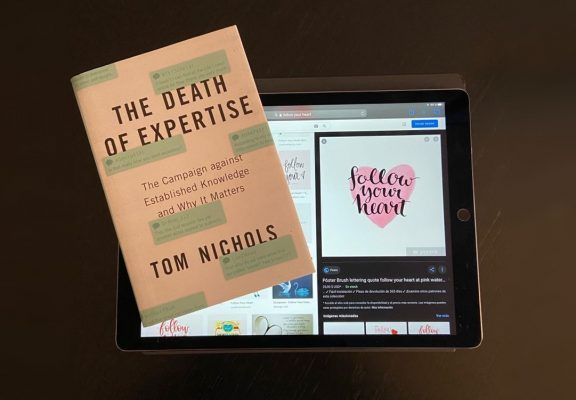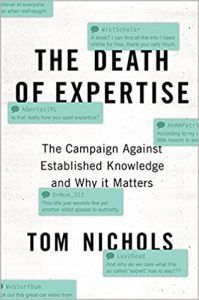

‘The Death of Expertise’, by Tom Nichols
“Knowledge is not the same as understanding and understanding is not the same as analysis”

| No. of pages: | 238 |
| Publisher: | Oxford University Press |
| Language: | English |
| ISBN: | 9780190469412 |
| Year of release: | 2017 |
| Year of original publication: | 2017 |
| Place of publication: | New York |
| Where to buy: | Amazon |
In 2 sentences:
"All voices, even the most ridiculous ones, demand to be considered with the same seriousness and any assertions to the contrary are sidelined as undemocratic elitism" "If the doctor told me this would happen, but if Gwyneth Paltrow tells me that blowing hot air on my private parts will cure all my ills, I'll pay attention to the blonde because the gal knows her science"
In 500 characters:
Although we have more access to information than ever before, this does not mean greater knowledge, or that intellect, expertise or qualifications are being valued.
There is an emerging rejection of “expertise”, which is being replaced by intuition, emotion and perception, that we defend and equate with rational knowledge.
Prioritizing intuition and emotions over rationale and knowledge creates an environment in which “we all know everything” and in which everything must be capable of being synthesized, summarized and cut down.
Why I should read it:
This controversial text argues that knowledge can often not be summed up in bullet points and that there are ideas that need to have their time and space to be explained and understood.
The book defends the intelligentsia, knowledge, expertise and training in a society in which those who know are not questioned for the mere fact that they have invested efforts in learning.
The author puts the spotlight on the US, although we feel the hypotheses and ideas the author defends can be perfectly extrapolated to the entire Western world and are particularly relevant in corporate environments (organizations and brands).
Finally, the book focuses on the political and academic arenas. However, many of the contents are applicable to strategy and innovation processes in organizations and brands.
10 inspiring contents:
- The United States is a country obsessed with dumbing itself down, where there is a pride attached to not knowing things. Ignorance is transformed into virtue: there is active resistance to learning or knowing more. The author goes even further and at several points refers to ignorance as something “hip” among those who purport the rejection of the intellectual as a sign of contemporary cultural sophistication.
- Expertise” is not only sidelined, but aggressively so, as a result of changes in the spaces and channels in which ideas are exchanged. The author makes special reference to social networks, changes in university education and the media.
- The virtually universal access to information outlines the differences between professionals and amateurs, students and teachers: between those who have an intellectual achievement and those who do not.
- The author repeatedly argues that public space (media, companies, academia) is made up of uninformed people who seem to know everything, who hold themselves up as self-taught and who reject any form of regulated education and expertise. The author quotes Ortega y Gasset and his critique of pseudo-intellectuals, without qualifications and unclassifiable.
- Exchange of opinion and knowledge is essential, but that does not mean that all views serve equally or that they all have the same value. The role of talent, training, expertise and peer validation is critical when assessing contributions.
- Knowing things is not the same and understanding them and understanding is not the same as analysis. Doing things right is not the same as becoming a credible source of support or learning on a particular subject. Building on the author’s words, “singing well at karaoke does not make you the next winner of The Voice”.
- “Confirmation bias” is a phenomenon the author delves into, referring to the tendency to search only for information that confirms what we already believe, to accept only facts that reinforce our way of explaining something and disregarding data that challenges what we already accept as true.
- There is a profound difference between generalizing and stereotyping, although both are equally criticized. The author particularly condemns the creation of stereotypes, since unlike generalizations, they are grounded in ideology.
- For the author, Brexit is a great example of how the intellectual world gets politicized, places itself on only one side of the political spectrum and therefore it is forced to compete with emotions and feelings.
- Experts sometimes offer the wrong advice and make mistakes, but society needs them, no matter how much we are determined to brush them aside. Ignoring informed experts is neither realistic nor advisable. Selfishly, the more sound the expert, the better for the people and society in general.
Professional book reviews:
If you are interested in this text, you might also like:
- The Tyranny of metrics, de Jerry Z. Muller
- Fantasyland, de Kurt Andersen